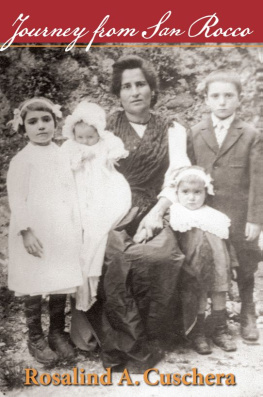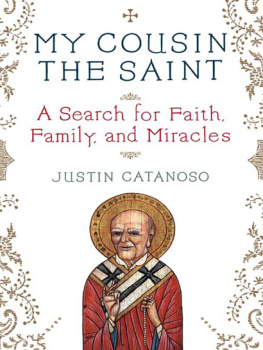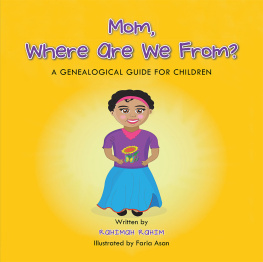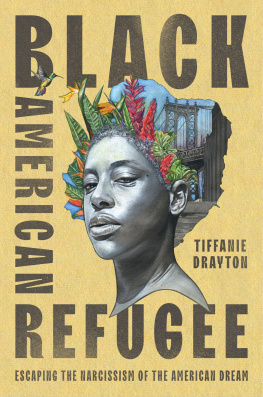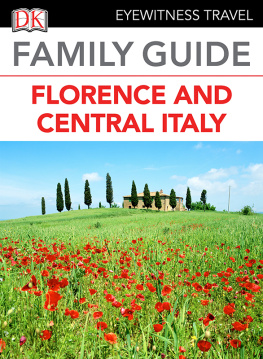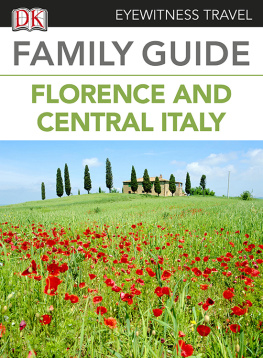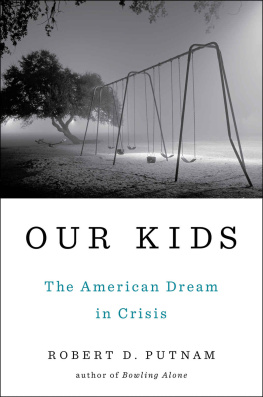Journey from San Rocco
Published by Rosalind A. Cuschera at Smashwords
Copyright 2013 Rosalind A. Cuschera
This ebook is licensed for your personal enjoymentonly. This ebook may not be re-sold or given away to other people.If you would like to share this book with another person, pleasepurchase an additional copy for each person. If youre reading thisbook and did not purchase it, or it was not purchased for your useonly, then please return to Smashwords.com and purchase your owncopy.
All rights reserved. No part of this book may be usedor reproduced in any form without permission, except for briefquotations used in reviews and critical articles.
Journey from San Rocco is a fictionalizedmemoir based on family remembrances. Names and identifying detailshave been changed.

Dedication
For my beloved parents, Donata and RosarioCuschera,
Zia Domenica, Zio Cesidio, Grace Cipriano,
and all the special people who inhabit the pages ofthis book.
May it be a welcome legacy to my children, Joseph andDenise,
and my grandchildrenCody, Chase, Devin, Owen andSpencer.
Acknowledgements
A special thank you to my cousins, Rosario andMadeline Cushera, who piqued my interest in genealogy, and to mysister, Kathy Vissa, who shared it.
A debt of gratitude is especially owed to A. CarterJefferson and my fellow classmates at the University ofMassachusetts Osher Lifelong Learning Institute (O.L.L.I.) inBoston, as well as to many family members and friends for theirencouragement and support.
these three remain:
Faith, Hope and Love
and the greatest of these is Love.
1 Corinthians 13:13
Chapter 1
The Fatal SparkOctober 1918
The night passed quietly. The constant shelling hadceased. Light broke gently over the Austrian battleground, causingsome movement in the foxhole. Antonio Leonardi stood guard. Hestretched his tall, muscular body, making as little noise aspossible. Carefully, he removed his dusty helmet and passed hisfingers through his clipped black hair, rubbing his head in asingle motion. Lifting his canteen, he splashed the precious littlewater onto his unshaven mustached face, smoothing the liquid offwith his now-bedraggled scarf. He replaced his helmet and resumedhis watchful position.
The trench smelled of dampness, dysentery, and death.Antonio saw rats scampering along the ditch. Like us, hethought, rats in a hole trying to escape the light. His onlycompensation was having his friend, Guido, by his side. They hadgrown up together and fought side by side, sharing rations andhope. Their bond, stronger than brotherhood, was built on memories,pain, terror, and faith that the war would end soon and they wouldreturn home to their families, together.
Antonios thoughts drifted to the day hed left tojoin in a war that few were enthusiastic about fighting. Each townwas committed to providing men to join the war, and Antonios turncame in its second year. Rumors about serious shortages ofequipment, doctors, and ammunition proved to be true. Withoutgrenades in the early part of the war, some Italians were forced tothrow rocks when their ammunition ran out and frequently collectedarms from the fallen after a battle. Countless wounded were leftunattended, and transportation problems occasionally caused severeshortages of food and water. All this misery, Antoniothought, just to gain land through the high mountains thatbordered Italy and Austria. Land, that in truth, was a series ofdesolate, rocky ridges, often covered in snow and ice.
Antonio shifted on a section of log pressed into theside of the trench which provided a makeshift seat to avoid sittingon the cold, muddy earth. As the sun rose, his comrade Guidostirred, coughed, and groaned as he stretched out legs cramped fromburrowing in the damp earth. Antonio smiled at his hometown friend.Buon giorno, mio fratello. Guido looked at his friend,nodding a greeting. People say the war is almost over. One morestrong attack on those Austro-Hungarians and they should befinished. So why are we still here, Antonio? Everybody wants moreof somethingmore land, more money, more power. If we kill eachother, who will benefit?
Im ready to go home to my family, Antonio replied.Caterina wrote the new baby is a handful, like me. He laughed. Icant wait to see my new bambina. Shes almost two years old now.His mind tried to picture the new baby, but instead filled with theimage of his wife, Caterina, a dark, fierce beautya classicMediterranean woman, full-figured with soft curves. Caterina hadthe most provocative walk of any woman he had ever met. Althoughnot very tall, she walked with confidence. She commanded attention,and basked in it.
Antonios thoughts were interrupted by Guidosshifting into a kneeling position. He watched Guido straighten outhis uniform, and settled himself to scan the horizon for anyactivity. The stillness in the trench and on the field, stilllittered with dead bodies, filled Antonio with a cold dread. Heforced himself to forget his surroundings and think aboutCaterina.
He remembered her chocolate-brown eyes, which had apiercing, knowing quality that could show warmth and a mischievoushumor. He dreamed of burying his face in the thick black hair thatcurled softly down her back. In public, she wore it braided intosoft, full rolls that crowned her sun-kissed, olive face.
His Caterina could be a terror at times, but he lovedher too much to take offense at her occasional temper tantrums. Herecalled the time he repaired shoes for their neighbor, MagdaCedrone. The woman was embarrassed; she had no money but needed theshoes for her children.
No charge, Antonio said. Its a Christmaspresent.
Caterina was livid at his generosity, and perhaps alittle jealous, too. She threw all the shoes from his cobblersshop out the door into the street, shouting, Here, be the grandpatron to everyone! Why not? Your wife and children can always eatthe leather!
That woman, she could draw a crowd, but he loved herdeeply and passionately and told her often, mostly in notes hiddenin their bed. Although the war separated them, his letters andcards faithfully testified to his love and loneliness for her.
His children, though, were his greatest blessing;Paolo, his intelligent, serious son, and the two girls, Geneva, whoalways greeted him with squeals of delight and pleas for bouncyshoulder rides, and Dina, his sweetest, most loving child. The newbaby, Loretta, was still a mystery since she had been born while hewas in the army. Caterinas letters assured him that she lookedlike him, and was just as playful, cheerful, and energetic as herfather.
Antonio roused from his musings. One more day,Guido, and well be rotated to the rear for a rest.
Guido reached into his jacket and pulled out twocrushed cigarettes. After reshaping them, he searched for a drymatch and offered one to his friend. One last luxury, hesaid.
Antonio gratefully accepted it and bowed his head ashis friend lit the match to the cigarette. A thunderous shot brokethe quiet. Guido froze as the body of Antonio, his friend, hisbrother, fell across him.
Chapter 2
Cold RealityJanuary 1919
Graciella was carefully balancing her water jar uponher head when she saw the parish priest, Padre Alberto, rushingacross the square. She watched him turn and climb up the bank ofstone steps leading to Caterinas house. She rushed after him soswiftly she nearly dropped the stone jar. As the priest paused atCaterinas door, Graciella lowered the jar, set it on the lowerstep, pocketed her head cushion, and ran up to the priest. Heturned and sighed deeply. His eyes and bowed head told her that hehad bad news.
Next page
